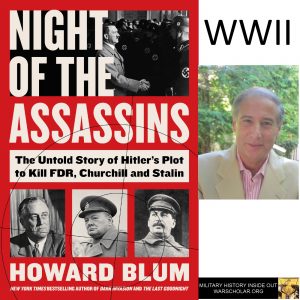 World War 1 – An interview with Jonathan Schneer about his new book The Lockhart Plot: Love, Betrayal, Assassination and Counter-Revolution in Lenin’s Russia published by Oxford University Press. The book discusses a British assassination plot directed against Lenin and Trotsky. Check out the book here https://amzn.to/35MCf82
World War 1 – An interview with Jonathan Schneer about his new book The Lockhart Plot: Love, Betrayal, Assassination and Counter-Revolution in Lenin’s Russia published by Oxford University Press. The book discusses a British assassination plot directed against Lenin and Trotsky. Check out the book here https://amzn.to/35MCf82
How did you become interested in studying and writing on the subject of your book?
I met Tania Alexander in London in about 1985. She had been born in Petrograd, Russia, (Petersburg today) in 1915 and had moved to the UK sometime during the 1930s. She passed away in 2004. We became good friends, and I would stay with her whenever I went to England to research a book. She had written an autobiography called An Estonian Childhood and, in fact, she had led a most interesting life. But the book was as much about her extraordinary mother as it was about her.
Her mother was the Baroness Budberg. Many historians have written about the Baroness, and she is the subject of two biographies. But the Baron Budberg was her second husband (and one with whom she did not spend much time). Previously she had been married to Djon von Benkendorff, a Russian diplomat and aide de camp to the Tsar during World War I, who was also Tania’s father, and who was murdered in 1918. Tania’s mother loved deeply, and romantically, only one man, however, and it was neither Budberg nor von Benckendorff, but rather Robert Hamilton Bruce Lockhart, whom she met in February 1918, when he arrived in Petrograd as Lloyd George’s emissary to the Bolsheviks. I first learned about the Lockhart Plot from Tania, while discussing her mother. I realized immediately that the Plot could be the subject of a great book. Eventually it dawned on me that I could write it.
What is the book about and what major themes do you focus on?
On the one hand, the book traces how Bruce Lockhart and his circle came to develop a plot to murder Lenin and Trotsky and to overthrow the Bolsheviks in order to install a Government that would bring Russia back into the war against Germany. And how the Bolshevik secret police, the Cheka, led by “Iron Felix” Dzerzhinsky, penetrated the plot, defeated it and launched a Red Terror. On the other hand, the book is about the all-consuming love affair between Bruce Lockhart and Moura von Benckendorff. It is very much a true historical thriller and romance.
Also, it is a story about the curdling of idealism on both sides: for Bruce Lockhart’s circle began as idealists who hoped to establish good relations with the Bolsheviks – and wound up planning to kill them; while, of course, the Bolsheviks themselves began with the intention of turning their country into a socialist paradise. Moreover, despite his genuine protestations of undying love, Bruce Lockhart basically left Moura in the lurch. And this, as the book shows, despite her probably having saved his life.
What sort of terms did Lockhart and/or the British feel they could negotiate over with the Bolsheviks before the plot began?
Prime Minister David Lloyd George sent Bruce Lockhart to Russia to persuade the Bolsheviks to stay in the war with Germany or, if they insisted on getting out, to sign a peace treaty with Germany that did not hurt British interests. It was Mission Impossible. The Bolsheviks took Russia out of the war anyway, without regard to what Britain wanted.
Bruce Lockhart thought, however, that Russia might get back into the war, if Britain offered economic and even military aid. Britain wanted to safeguard three Russian ports that were filled with war materials: Murmansk and Archangel in the northwest and Vladivostok in the far east. For a few months Bruce Lockhart genuinely believed Russia still needed Britain as a counterweight to Germany, even though Russia was out of the War. He thought that if Britain offered aid to Russia, the Bolsheviks would let them into the ports in return. And, indeed, the Bolsheviks did fear that Germany might invade and overthrow them.
But when the German General, Ludendorff, launched the last great offensive on the western front, the Bolsheviks realized Germany presented no threat to them anymore, and they ignored Bruce Lockhart’s proposals. So, Bruce Lockhart advised Britain to occupy the ports without Russian permission. It was a short step from that to advising that Britain and the Allies join with Russian counterrevolutionaries to overthrow the Bolsheviks.
Why did Lockhart or others involved in this plot have reason to believe they could reverse the Revolution by simply killing Lenin and/or Trotsky?
Killing Lenin and Trotsky was hardly the entire plan. Bruce Lockhart thought he had bribed the leaders of the Latvian Rifle Brigade, which, at a time when the Russian Army was simply melting away, had been the Bolsheviks’ most reliable military support. The plan was for Allied forces to head south from Archangel, and west along the Trans-Siberian Railway, shepherded by the Latvian Rifle Brigade, and to meet in a town called Vologda, from which they could threaten both Moscow and Petrograd. With the help of the Rifle Brigade again, and White Russian counter-revolutionary forces, they could take those two most important cities.
Allied agents and counter-revolutionaries already were destroying crops, blowing up infrastructure, to make governing Russia, and feeding it, harder for the Bolsheviks. Simultaneously, they were stockpiling food to be released as soon as a new regime took over. A meeting of top Bolsheviks was to take place in Moscow on September 14, 1918. That was when, and where, Bruce Lockhart’s group thought they could capture and kill Lenin and Trotsky – once again with the help of the Latvians. For further details of the Plot, read the book.
Was there any German involvement in trying to stop this plot?
No.
What happened to British and Soviet relations after this event?
Well, obviously, the Lockhart Plot did not improve them. In fact, it hardened Bolshevik suspicion of the West. And what goes around, comes around: now we have Putin meddling here. (Not as a direct consequence of the Lockhart Plot, of course.)
Bruce Lockhart’s original plan was a better one: if Britain had followed his earlier advice, and worked with, rather than against, the Bolsheviks, then British-Soviet relations would have evolved much more smoothly. Also, if the Soviets had less reason to fear and hate the West, they might have softened their hardline domestic policies. But that is a “what if,” nothing more.
What resource materials or archives did you primarily use for your research?
I spent many months at the National Archive in Kew mainly going through Foreign Office and Admiralty files, but many others too, including recently released MI5 documents. I saw Lockhart’s diaries at the House of Lords Records Office. I visited archives at the Imperial War Museum, Cambridge University, Oxford University, Leeds University, Kings College, London. Oddly, Lockhart’s papers are held by two US institutions, the Hoover Institute at Stanford University, and Indiana University. The Hoover Institute holds many other relevant collections. The Wisconsin Historical Society has the diary of one of Bruce Lockhart’s close associates, Raymond Robins.
Also, I was enormously lucky to find a research assistant, Andrey Shlyakhter, who is just now defending his PhD dissertation for the University of Chicago. Andrey, who was born in Russia, helped me find, and then translated for me, not only the obvious Russian sources, but many obscure ones. Through Andrey, I corresponded with Russian and Ukrainian scholars, and accessed documents few Westerners have seen.
Finally, an American historian of Russia, Richard Spence, gave me Russian documents he obtained years ago, the originals of which are no longer available to scholars. Through Richard, I also viewed French Intelligence documents.
Was there a particularly difficult issue to research because of lack of information or access to information?
Yes, and this is key. The central theme of the book is difficult to research. Bruce Lockhart’s plot was an illegal, early, attempt at regime change. The British Government claimed never to have sanctioned it. Bruce Lockhart, himself, claimed that it was not his plot but Sidney Reilly’s. I am certain he lied about that, but I cannot prove it. There are no entries in his diary for the twenty or so days before the Plot was supposed to launch. Anyway, he always knew the diary might be confiscated, so was careful what he wrote in it. The same is true for the cables he sent to the Foreign Office and that the Foreign Office sent to him. There is no smoking gun cable announcing, or authorizing, the Plot. I suspect, but cannot prove, that Foreign Office officials weeded the files. In the book, I never state positively something that I only suspect. I lay out the evidence and let the reader decide.
Secondly, Russian files, notably the Cheka files held at the FSB Academy, would certainly cast light into the Plot’s shadowy corners. For a moment, while Gorbachev held power, researchers could have seen them. I do not believe any historian was working on the Plot then, however. And then, when Gorbachev fell, that window slammed shut.
Were the Cheka particularly skillful at what they did or they mostly use terror and brutality to combat what they perceived to be problems?
The Cheka was extraordinarily skillful. Its leader, “Iron Felix” Dzerzhinsky, is one of the Revolution’s most striking characters, a Bolshevik Savonarola “rooting out the heretics.” He had spent a quarter-century plotting against the Tsar, so knew all there was to know about plotting. With regard to the Lockhart Plot, he knew that British and French and American officials in Russia were plotting against the Bolsheviks, and that they were interested in the Latvian Rifle Brigade, but he had no details. Basically, he sent three Latvian Cheka agents pretending to be counter-revolutionary officers in the Rifle Brigade to meet Bruce Lockhart and colleagues. Bruce Lockhart thought he finally had found the military support he needed to ensure success. The rest is history.
Afterwards, the Cheka grew increasingly brutal. Dzerzhinsky launched the first “Red Terror” when he thought Bruce Lockhart’s plotters had somehow gotten a step ahead of him. That set an awful precedent. Dzerzhinsky is a fascinating figure who was prepared to build and defend what he truly thought was going to be a socialist paradise in Russia — by whatever means were necessary.
What is your current or next writing project?
I am in the midst of writing a big book about the British General Strike of 1926. I began as a labor historian, and I am now returning to my roots.
Where can people find you online?
I do not blog or have a web page. People can Google my name and find many, many entries. They show my other books, interviews, etc. There is also a Wikipedia entry.
Biographical information
Name: Jonathan Schneer (Emeritus Professor, Georgia Institute of Technology)
Position and specialty: Historian of Modern Britain
Project/work being discussed: The Lockhart Plot: Love, Betrayal, Assassination and Counter-Revolution in Lenin’s Russia, OUP, 2020.
Links of interest
Check out the book here https://amzn.to/35MCf82
https://global.oup.com/academic/product/the-lockhart-plot-9780198852988?cc=us&lang=en&
As an Amazon Associate I earn from qualifying purchases.


